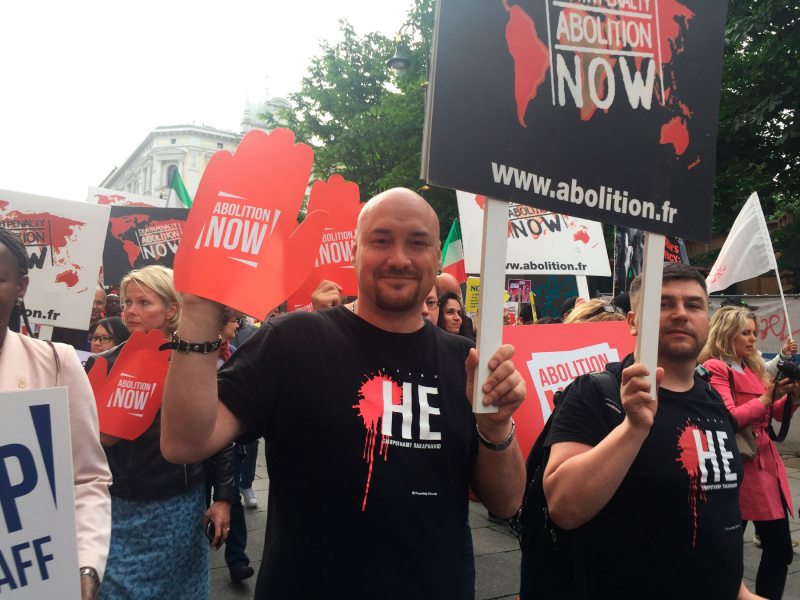Viasna to join World Coalition against the Death Penalty
Joining forces with supporters of the global abolitionist movement is another step of the Belarusian human rights defenders towards ending the death penalty in the country. At the same time, Belarus is marked on the world map as a place where death sentences are often imposed on representatives of the most vulnerable groups.
Viasna’s contacts with the World Coalition against the Death Penalty were promoted by the International Federation for Human Rights (FIDH) in the framework of the campaign "Human Rights Defenders against the Death Penalty in Belarus." Experts and activists of the campaign took part in three World Congresses against the Death Penalty, in Geneva in 2010, in Madrid in 2013 and in Oslo in 2016. In turn, representatives of the Coalition have repeatedly met with Viasna’s human rights activists, both at international fora and in Belarus. Last October, the country was visited by the first president of the Coalition Florence Bellivier, who said that Viasna and the Coalition apply similar approaches in their work, and voiced the idea of the NGO’s accession to the world alliance of abolitionists.
For the fifth consecutive year, the Human Rights Center "Viasna" has been organizing a week against the death penalty, which culminates on October 10 — World Day Against the Death Penalty, which was established by the Coalition.
Poverty and the death penalty is the theme of this year’s Day. Its main purpose is raising the issue of discriminatory approaches in the application of the death penalty, often used against the poor.
“The application of the death penalty is inextricably linked to poverty. Social and economic inequalities affect access to justice for those who are sentenced to death for several reasons: defendants may lack resources (social and economic, but also political power) to defend themselves and will in some cases be discriminated against because of their social status,” the Coalition said on the occasion of the 15th World Day Against the Death Penalty.
For years of work in cases of persons sentenced to death in Belarus, the Human Rights Center "Viasna" has repeatedly dealt with similar situations.
“Many of those sentenced to death, on whose cases we worked, represented the lowest social groups. These are the people who lived in poverty, and they did not have funds to hire a lawyer who could defend them during the investigation and trial. In a few cases, death sentences were handed down to representatives of the Roma nationality. One of the death convicts was illiterate and did not even have citizenship. And the coverage of this case by the Belarusian TV emphasized the convict’s ethnicity, which made us write to the state TV company asking to put an end to such practices. Of course, Belarus does not so clearly manifest social stratification as in South America or in Africa, however, in the context of the death penalty, we are witnessing this phenomenon,” Valiantsin Stefanovich, expert of the campaign against the death penalty, said.
In one of the videos published on the Coalition’s website Tamara Sialiun, whose son was sentenced to death in Belarus, shares the great difficulties she encountered with Andrei Paluda (coordinator of the campaign “Human Rights Defenders against the Death Penalty in Belarus”). Paluda does his best to give moral support to the woman who is left alone with their grief. “Poverty and Justice — a deadly mixture”, this is how the human rights activist outlines the problem using the slogan of the World Day against the Death Penalty (Watch the video by clicking the map below).
Today the Human Rights Center "Viasna" continues to urge the authorities of Belarus to introduce a moratorium on executions as a first step towards the complete abolition of this inhuman form of punishment and uses all available means to preserve public focus on the subject at both national and international levels.
“Viasna’s accession to the World Coalition against the Death Penalty reinforces the chorus of protest against executions in Belarus and brings the issue to the international level. Together with millions of activists from all over the world, we are fighting so that the world could finally say goodbye to the death penalty and through it became more compassionate and better. No to the death penalty!” Ales Bialiatski, chairman of the Human Rights Center “Viasna” said.
The World Coalition against the Death Penalty, an alliance of more than 150 NGOs, bar associations, local authorities and unions, was created in Rome on 13 May 2002. It was founded as a result of the commitment made by the signatories of the Final Declaration of the 1st World Congress Against the Death Penalty organized by the French NGO Together Against the Death Penalty (ECPM) in Strasbourg in June 2001.
The aim of the World Coalition is to strengthen the international dimension of the fight against the death penalty. Its ultimate objective is to obtain the universal abolition of the death penalty. To achieve its goal, the World Coalition advocates for a definitive end to death sentences and executions in those countries where the death penalty is in force. In some countries, it is seeking to obtain a reduction in the use of capital punishment as a first step towards abolition.
The World Coalition is striving to achieve these aims in the following ways:
by supporting its member organisations, local, national and regional abolitionist forces;
by coordinating the international advocacy towards worlwide abolition of the death penalty.
To watch the videos, click on the photos on the map


